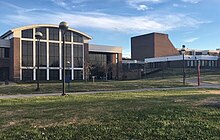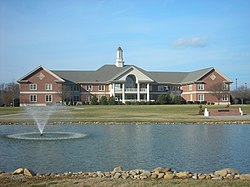 WSCC campus in 2018 | |
| Type | Public community college |
|---|---|
| Established | September 1970 |
| Endowment | $6.9 million[1] |
| President | Tony Miksa |
Academic staff | 480 |
| Students | 6,980 |
| Location | , , United States 36°12′50″N 83°15′47″W / 36.214°N 83.263°W |
| Campus | Suburban |
| Colors | Red, White and Navy |
| Nickname | Senators & Lady Senators |
| Affiliations | NJCAA Region VII |
| Website | ws |
Walters State Community College (abbreviated as WSCC, and commonly known as Walters State) is a public community college based in Morristown, Tennessee. It was founded in 1970 and is operated by the Tennessee Board of Regents. The college was named in honor of former United States Senator Herbert S. Walters.[2]
The college serves ten predominantly rural East Tennessee counties,[3] located in the area of the Clinch and Great Smoky Mountains with five campuses totaling approximately 6,200 degree-seeking, commuting students.[4] The college offers over 100 programs of study, ranging from transfer programs to four-year universities, to two-year associates and technical certificate programs.[5]
History
[edit]In 1957, the Pierce-Albright Report was presented to the Tennessee legislature, detailing situations of higher education in the state. It showed many citizens of the state of Tennessee to be without sufficient access to colleges and universities, and led to the allocation of $200,000 in 1963 to implement the recommendations of the report.[2]
The State Board of Education developed a plan to locate community colleges in the underserved regions of Tennessee within a reasonable distance of travel to the majority of residents in each region. In 1965, the Tennessee General Assembly certified the establishment of the first wave of these institutions. In 1970, Walters State Community College became the sixth college created in this process, named for former U.S. Senator Herbert S. Walters who was responsible for the development of a community college in Morristown.[2][6]
Walters State was accredited by the Southern Association of Colleges in 1972, and received reaffirmation of accreditation in 1976, 1987 and 1997.[2]
In 2017, a hiking-mountain biking trail system would be constructed at the main campus at a natural area surrounding the college's public safety complex.[7]
Presidents
[edit]- James W. Clark, was appointed as the first president of Walters State Community College in 1969 and served in that capacity until 1974.[8] While classes were held in temporary quarters in Morristown during the first year of the college's operation, Dr. Clark oversaw the completion of The College Center, the first building built on the campus and opened in 1971.[8]
- Dr. Jack E. Campbell, who was hired in 1974 to succeed Clark, was considered one of the youngest college presidents at the time. Under his leadership, the campus expanded from the one campus location in Morristown with a population of 1,736 students to having four campuses,[9] with a total student population of 6,000 credit degree-seeking students and 5,000 students in non-degree, job training and continuing education courses at the time of his retirement in 2005.[10] The College Center would be renamed in Dr. Campbell's honor.[11]
- Wade B. McCamey, who had previously been the president of Roane State Community College and previously served as vice-president of academic affairs at Walters State Community College, was selected in 2005 and has served in that capacity until 2016. During his tenure, the college experienced more growth and expansion through the building of additional facilities on the Sevierville Campus, the Morristown campus (with one of the facilities named the Dr. Wade B. McCamey Student Services building upon his retirement) and the Greeneville-Greene County campus(Named The Niswonger Campus for Greeneville Philanthropist, Scott Niswonger).[12]
- Anthony (Tony) Miksa, was named the fourth president of Walters State in May 2016, and his tenure began on June 1.[13]
Athletics
[edit]Walters State's athletics programs are part of both the National Junior College Athletic Association (NJCAA) and the Tennessee Community College Athletic Association (TCCAA). The teams are known as the Senators or Lady Senators, with the team colors being red, white, and blue.[14]
| Men's sports | Women's sports |
|---|---|
| Baseball | Basketball |
| Basketball | Cross country |
| Cross country | Softball |
| Golf | Volleyball |
| Cycling |
Campuses
[edit]The Tennessee Board of Regents designates ten counties as being served by Walters State Community College:[3]

As its reach extends across a geographically large region, there are four campuses of Walters State Community College. The primary campus is located in Morristown, while satellite branches are found in Sevierville, Greeneville, and New Tazewell. In mid-2010, the Claiborne extension moved into the former Claiborne County High School building. In late 2020, Walters State opened a campus in Cocke County, at the Tanner Building in Newport.[15]
- List of Campuses
- [16]
- Morristown (Main Campus)
- Greeneville (Niswonger Campus)
- New Tazewell-Claiborne County
- Sevierville
- Newport-Cocke County
Notable alumni
[edit]- Ben Joyce, MLB Pitcher
- Dulcy Fankam Mendjiadeu, WNBA Forward
- Rodney Atkins, country music musician
- Chad Bell, MLB pitcher
- Tilman Goins, former state representative
- Michael Harrison, politician
- Brent Honeywell Jr., MLB pitcher
- Ryan Kelly, MLB pitcher
- Michael K. Locke, former state representative
- Brett Martin, MLB relief pitcher
- Steve Southerland, politician
- Keith Westmoreland, former state representative
-
Rodney Atkins in 2009
-
Brent Honeywell in 2016
References
[edit]- ^ "Walters State Community College". Retrieved 2007-07-06. [dead link]
- ^ a b c d "History". Walters State Community College. Archived from the original on September 1, 2020. Retrieved September 11, 2020.
- ^ a b "Walters State Service Area". Archived from the original on 2008-04-21. Retrieved 2008-04-04.
- ^ "About". Walters State Community College. Archived from the original on September 1, 2020. Retrieved September 11, 2020.
- ^ "Academics". Walters State Community College. Archived from the original on 2021-04-16. Retrieved 2021-04-25.
- ^ Hill, Ray. "'Mr. Hub". Knoxville Focus. Archived from the original on 4 March 2022. Retrieved 4 March 2022.
- ^ "Come Celebrate Hiking, Biking Trail Opening". Walters State Community College. October 27, 2017. Retrieved March 4, 2022.
- ^ a b "50 Years, Timeline: 1969-1977". Walters State Community College. Archived from the original on October 27, 2020. Retrieved October 22, 2020.
- ^ "50 Years, Timeline: 1978-1986". Walters State Community College. Archived from the original on October 27, 2020. Retrieved October 22, 2020.
- ^ "50 Years, Timeline: 1987-1995". Walters State Community College. Archived from the original on 2020-10-26. Retrieved 2020-10-23.
- ^ "50 Years, Timeline: 1996-2004". Walters State Community College. Archived from the original on October 26, 2020. Retrieved October 22, 2020.
- ^ "50 Years, Timeline: 2005-2013". Walters State Community College. Archived from the original on October 26, 2020. Retrieved October 22, 2020.
- ^ "50 Years, Timeline: 2014-2020". Walters State Community College. Archived from the original on October 26, 2020. Retrieved October 22, 2020.
- ^ "2021 EADS Survey" (PDF). Walters State Athletics. Archived (PDF) from the original on May 11, 2022. Retrieved March 4, 2022.
- ^ Snader, Ray (February 12, 2020). "Walters State to open Newport campus in Tanner Building". Citizen Tribune. Archived from the original on February 15, 2020. Retrieved September 11, 2020.
- ^ "Campuses". Walters State Community College. Archived from the original on December 7, 2023. Retrieved April 25, 2021.

